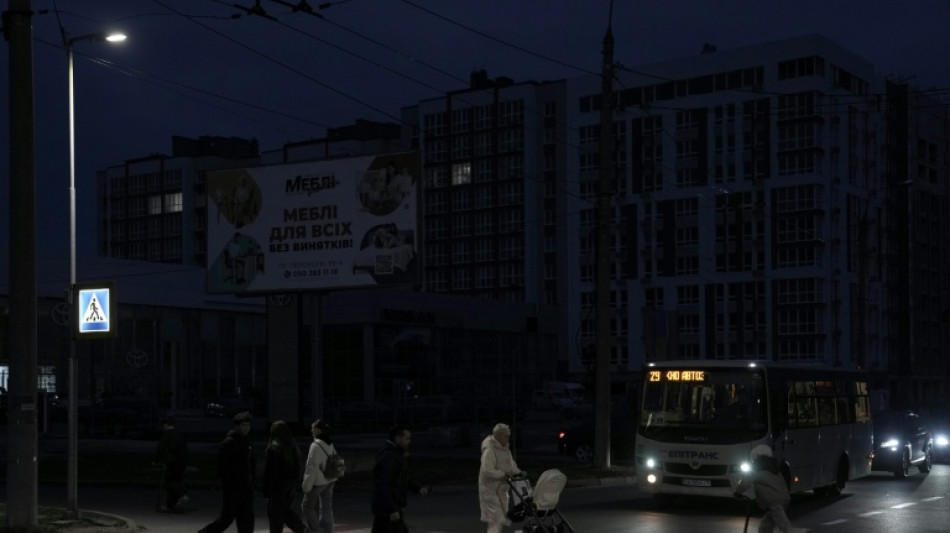
Ukraine scrambles for energy after Russian attacks

Ukraine was scrambling to turn lights and heating back on Sunday after Russian attacks targeting energy infrastructure, which had crippled some of the country's power generation.
Moscow, which has escalated attacks on Ukraine's infrastructure in recent months, launched hundreds of drones at energy facilities across the country overnight into Saturday.
Ukrainian strikes on Russia's own infrastructure meanwhile left more than 20,000 people without power in regions bordering Ukraine, local authorities said.
The Russian attacks interrupted electricity, heat and water supplies in several cities.
The strikes affected power plants of Centrenergo, one of Ukraine's power generating companies.
The company website says it used to power 15 percent of Ukraine with three power plants -- one of which is now in territory occupied by Russia.
"Currently, power generation is down to zero," Centrenergo said Saturday.
Power would be cut for between eight and 16 hours a day across most regions of Ukraine on Sunday, state power transmission system operator Ukrenergo said, while repairs were carried out and energy sourcing diverted.
Ukraine's energy minister called it "one of the most difficult nights" since Russia sent troops into Ukraine in February 2022.
While the situation had somewhat stabilised, regions including Kyiv, Dnipropetrovsk, Donetsk, Kharkiv, Poltava, Chernigiv and Sumy could continue to see regular power cuts, Svitlana Grynchuk said Saturday evening.
"The enemy inflicted a massive strike with ballistic missiles, which are extremely difficult to shoot down. It is hard to recall such a number of direct strikes on energy facilities since the beginning of the invasion," she told local broadcaster United News.
Russian drones had targeted two nuclear power substations deep in western Ukraine, Kyiv's Foreign Minister Andriy Sybiga said, calling on the UN's nuclear watchdog to respond.
The substations powered the Khmelnytskyi and Rivne nuclear plants, around 120 and 95 kilometres (75 and 59 miles) respectively from Lutsk, he said.
"Russia is deliberately endangering nuclear safety in Europe. We call for an urgent meeting of the IAEA Board of Governors to respond to these unacceptable risks," he wrote on Telegram late Saturday, referring to the International Atomic Energy Agency.
Sybiga also urged China and India -- traditionally large buyers of Russian oil -- to pressure Moscow to cease its attacks.
- Winter without heat? -
Of the 458 drones and 45 missiles launched by Russia overnight into Saturday, Ukraine's air force said it downed 406 drones and nine missiles.
Experts said the strikes on energy infrastructure put Ukraine at risk of heating outages ahead of the winter months.
Russia has targeted the power and heating grid throughout its almost four-year invasion, destroying a large part of the key civilian infrastructure.
The barrage overnight into Saturday was the ninth massive attack on gas infrastructure since early October, Ukraine's energy company Naftogaz said.
Kyiv's School of Economics estimated in a report that the attacks shut down half of Ukraine's natural gas production.
Ukraine's top energy expert, Oleksandr Kharchenko, told a media briefing Wednesday that if Kyiv's two power and heating plants went offline for more than three days when temperatures fall below minus 10C, the capital would face a "technological disaster".
He said Ukrainian cities, which mostly rely on central heating, should prepare contingency plans to prevent buildings from freezing in case heating supplies are destroyed.
Ukraine has in turn stepped up strikes on Russian oil depots and refineries in recent months, seeking to cut off Moscow's vital energy exports and trigger fuel shortages across the country.
Fires broke out at a power plant in the western Kursk region and the southern Voronezh region after Ukrainian strikes, the regional governors said on Sunday.
Belgorod Governor Vyacheslav Gladkov said the "electricity and heating supply network has suffered severe damage" in the regional capital of the same name, following a barrage from Kyiv, which Gladkov said left "more than 20,000 residents" without electricity.
Russian authorities extended a ban on petrol exports until the end of October to curb soaring fuel prices following Ukrainian attacks on refineries over the summer.
D.Ch. Nadeau--SMC


 London
London

 Manchester
Manchester
 Glasgow
Glasgow
 Dublin
Dublin
 Belfast
Belfast
 Washington
Washington
 Denver
Denver
 Atlanta
Atlanta
 Dallas
Dallas
 Houston Texas
Houston Texas
 New Orleans
New Orleans
 El Paso
El Paso
 Phoenix
Phoenix
 Los Angeles
Los Angeles


